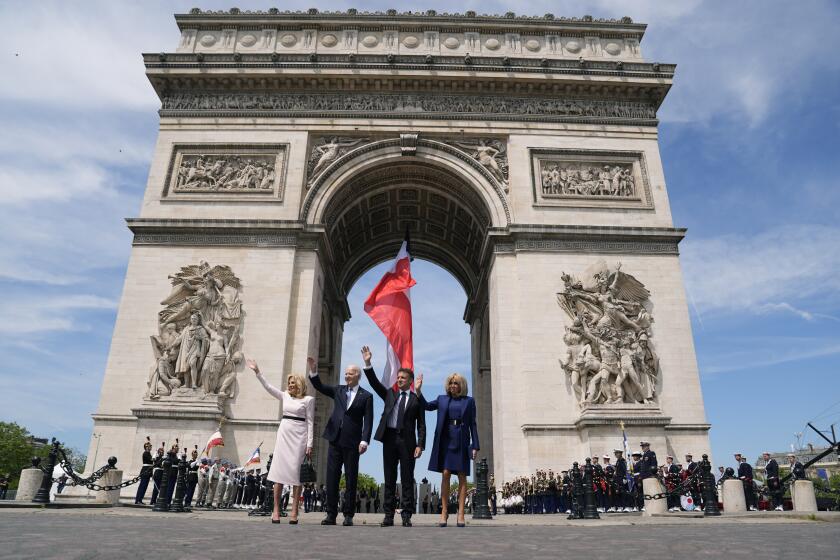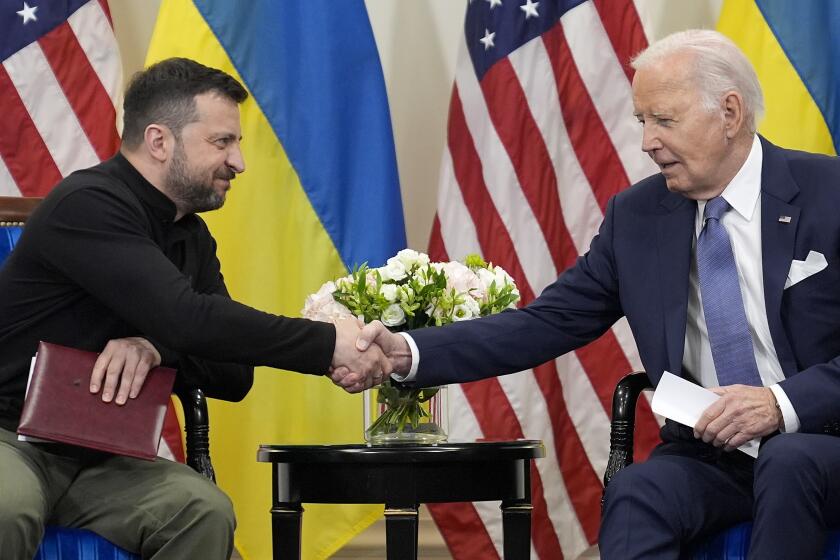In Europe, even if ‘center is holding,’ far right ascends

- Share via
BERLIN — Raucous cheers erupted and far-right leaders beamed into the camera lenses. The vote was in: The ultranationalist Alternative for Germany — for many here, a ghostly echo of the Nazi past — was now anointed as the country’s second-largest political party.
Across Europe, far-right political groupings notched strong gains in elections for the European Parliament in four days of balloting that ended Sunday. As predicted, centrist parties won the largest share of votes overall across the 27-nation European Union, but in several countries — most notably France and Belgium — the robust nationalist-populist showing set off political earthquakes.
French President Emmanuel Macron, whose party was trounced 2-1 by the far-right National Rally, called early national parliamentary elections that will take place only a few weeks before the showcase Olympic Games in Paris. In Belgium, the prime minister tearfully resigned after a right-wing party’s electoral triumph.
And in Germany, there was growing angst over the far right’s increasing inroads, which were most pronounced in the former East, but felt all across a country that reunified nearly 35 years ago following the fall of the Berlin Wall.
Although France and Germany are the bloc’s biggest and most influential members, analysts cautioned that their results do not necessarily reflect continent-wide political sentiment, since each individual EU member state has its own priorities and concerns.
And because the European Parliament has limited powers, the every-five-years exercise of choosing its composition can amount to something of a protest vote, whose results may or may not be replicated in contests for countries’ own parliaments and national leadership.
President Biden has closed out his trip to France by paying his respects at an American military cemetery that Donald Trump skipped visiting.
Even so, the balance of power in the 720-seat European Parliament shifted distinctly rightward. And in France at least, the results triggered what amounted to a “national meltdown,” said French political analyst Celia Belin.
“At the minimum, we can say this is massively unsettling and totally surprising, with absolutely unknown consequences,” Belin, of the European Council on Foreign Relations, said during a postmortem webinar by the think tank on Monday.
Macron’s political gambit of calling early elections is a risky one, analysts said. Although the snap parliamentary election won’t determine the presidency — that vote isn’t until 2027 — he could find himself hamstrung and humiliated if the National Rally, led by longtime nemesis Marine Le Pen, makes a showing at all comparable to that in Sunday’s vote.
Le Pen expressed confidence that the National Rally would do just that. In the European vote, her party was represented by her 28-year-old protege Jordan Bardella, but she will be its face in rounds of national parliamentary voting at the end of this month and in early July.
“We are prepared to exercise power if the French give us their trust in these elections,” Le Pen told jubilant supporters in Paris. “We’re ready to transform the country, to defend the interests of the French, to halt mass migration.”
Migration, the economy, climate change and the wars in Ukraine and Gaza all colored the election results, even though the European Parliament’s influence on those issues is mainly indirect. It approves the EU budget as well as its executive leadership, and its stances help shape the legislative agendas in the bloc’s national parliaments.
Europe’s far-right parties generally have in common a hard line on migration, a conservative social agenda, a reluctance to fund ambitious projects to fight climate change and a desire to erode the EU’s powers from within. But they differ on some matters, including the war in Ukraine and the degree of friendliness toward Russian President Vladimir Putin.
A vein of anti-establishment sentiment laid bare in the European vote could be a bellwether for U.S. presidential elections in November, some observers believe. Populist surges sometimes hopscotch across the Atlantic, as when Donald Trump’s 2016 election as president was preceded by Britain’s shock decision to exit the EU.
President Biden is feted by French President Macron with a state visit in Paris as leaders aim to show partnership on global security, ease trade tensions.
But others saw the balloting as an affirmation that although voters may have wanted to voice some symbolic discontent with the status quo, they nonetheless felt more comfortable leaving the actual business of governing in the hands of more moderate forces.
“The center is holding,” declared Ursula von der Leyen, the head of the bloc’s executive European Commission, whose job is on the line once the European Parliament consolidates itself into groups that reflect national parties’ political leanings.
That is a process that will take some weeks, with the new EU legislature holding its first session in mid-July.
Von der Leyen’s center-right European People’s Party won the largest number of seats, provisional results showed, followed by a center-left grouping. But coalition politics could still prompt her to seek an alliance with far-right Italian Prime Minister Giorgia Meloni, whose party — which has neo-fascist roots — emerged as the election’s big winner, leaving her positioned to play the role of political kingmaker.
In Germany, the center-left party of Chancellor Olaf Scholz was dealt a stinging but narrow defeat by the AfD, as Alternative for Germany is known. Scholz’s party suffered a far more substantial loss — by a more than 2-1 margin — at the hands of the main opposition, the center-right Union bloc.
Scholz’s Social Democrats racked up their worst post-World War II showing in a national vote, winning less than 14% to the AfD’s share of about 16%, according to preliminary tallies.
Still, the AfD showing was alarming to many Germans, especially in light of the fact that the party was hit by several scandals before the vote that probably cut into its support, which otherwise might have been even greater.
The party, designated by German authorities as a suspected extremist group, has had scrapes with the country’s strict laws on use of Nazi symbols. Its lead candidate in the EU elections, Maximilian Krah, caused an uproar by suggesting in a recent interview that some Germans who joined the Waffen SS, a Nazi paramilitary force, might have had justification for doing so.
That, combined with allegations that the AfD helped spread Russian influence, got it ejected from European Parliament’s far-right grouping, although that move could be reversed.
But the AfD’s strong showing in Sunday’s vote was an unwelcome reminder for many Germans — just after European allies solemnly marked the 80th anniversary of D-day, a turning point in the war against Adolf Hitler’s Germany — that the party is now an increasingly mainstream force in the country’s politics.
“The big thing that the AfD has managed to do is normalize its views — views that used to be considered very extreme,” said Sabine Volk, an analyst at the University of Passau.
President Biden publicly apologized to Ukraine’s president for a congressional holdup of military aid that let Russia make battlefield gains.
In recent years, Europe has emerged as a global leader on combating climate change, but the vote appeared to represent an overall blow to the environmentalist movement.
In the EU parliament, the Greens were projected to lose almost one-third of the seats they won five years ago. That echoed a Greens retreat in Germany, where they are part of Scholz’s governing coalition, falling from scoring more than one-fifth of the German vote in 2019 European elections to a projected 12% in Sunday’s balloting.
Belin, the French analyst, termed it a potential “greenlash,” but cautioned that the vote’s full implications for environmental policy were not yet clear. Environmentalist parties fared better in some parts of the continent, including Sweden and Denmark, and substantial portions of their agenda have been incorporated into the larger parties’ policies.
More to Read
Sign up for Essential California
The most important California stories and recommendations in your inbox every morning.
You may occasionally receive promotional content from the Los Angeles Times.













